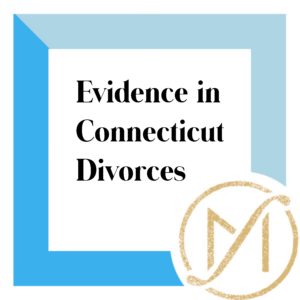 Evidence is anything that helps to prove that something is or is not true. Read on to learn how evidence works in Connecticut divorces.
Evidence is anything that helps to prove that something is or is not true. Read on to learn how evidence works in Connecticut divorces.
Discovery
Evidence gets shared between the parties via a process called “Discovery.” The idea is that all parties have access to the evidence that might be presented at trial well prior to trial. This is intended to avoid one of the things you see on tv and in the movies – where one side surprises the other with new evidence mid-trial. Lawyers call this “trial by ambush,” and it makes much better fiction than reality. Instead, discovery allows your attorney to design a plan to deal with potentially problematic evidence, for example, by locating new or additional evidence that contextualizes or responds. It also helps resolve cases because the sooner both sides have their arms around the relevant evidence in a case, the sooner the divorce attorneys can negotiate, and the two spouses can reach resolutions outside of court.
Read: Discovery in Connecticut Divorces
Read: Settlement & Divorce
Types of Discovery
Discovery includes everything from document exchange to testimony to written questions answered under oath.
Read: Requests for Admission and Divorce
Read: Depositions and Divorce
Relevant Evidence Definition
The Connecticut Code of Evidence defines “relevant evidence” as:
“[E]vidence having any tendency to make the existence of any fact that is material to the determination of the proceeding more probable or less probable than it would be without the evidence.”
That’s very broad, which is one of the reasons it’s essential to work with an experienced divorce attorney who understands how to design a sophisticated discovery strategy.
Read: Mandatory Disclosure and Production in Connecticut Family Law
Examples of Relevant Evidence in a Divorce
Connecticut divorces have their own set of documents that Connecticut has pre-decided are relevant in a divorce is called “Mandatory Disclosure and Production.” The rules also require “financial affidavits,” which disclose information about each spouse’s income, expenses, assets, and liabilities.
Read: Key Things to Know About the Financial Affidavit
Read: What is the Financial Affidavit in a Connecticut Divorce
When Relevant Evidence is Excluded
But what about evidence not covered by Mandatory Disclosure and Production or the financial affidavit?
Well, relevant evidence is admissible unless there is some reason the court decides that some other concern outweighs the value of the evidence. These concerns are generally reflected in either an “exception” or via a “privilege.” As a practical matter, if your spouse side seeks relevant information from you beyond the mandatory disclosures, they make the request. You will either provide that evidence or object to its exposure for a legitimate reason. When the two sides can’t reach an agreement, a judge decides.
Read: Privacy During Divorce
Exceptions
The court may exclude relevant information if it falls under an exception to the rules of evidence. Some examples include “prejudice, confusion, or waste of time” or “hearsay.”
Read: Attorney-Client Privilege and Divorce
Privileges
You also can’t be compelled to produce evidence subject to a “privilege.” The main privileges are:
- Attorney-client privilege
- Settlement, mediation, and negotiation privilege
- Healthcare provider privileges
- Certain communications made to clergy
- Privilege against self-incrimination, and
All of these are important and relevant in divorces. For example, the attorney-client privilege protects certain information you share in confidence as you seek legal advice. It also covers the legal advice your attorney provides. However, it’s possible to “waive” the privilege and create a situation where that information will come into play. Hence, it’s critical to consult your lawyer before sharing anything with anyone outside your legal team.
Read: How Not to Screw Up the Attorney-Client Privilege During Divorce
Read: Should I Tell My Divorce Lawyer Everything?
Next Steps
Please reach out with any questions.
The post Evidence in Connecticut Divorces appeared first on Freed Marcroft LLC.